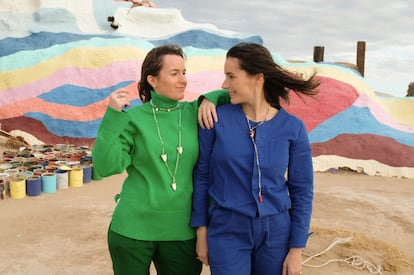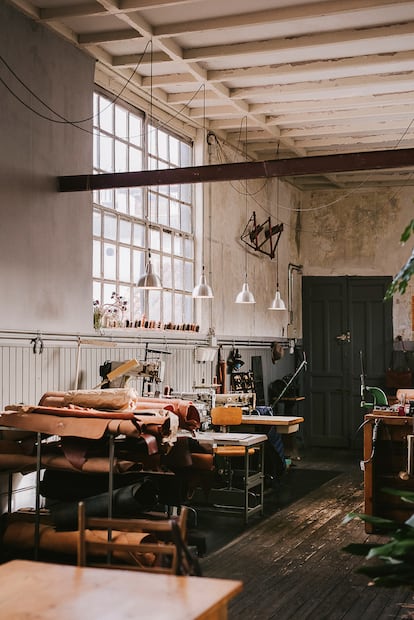Today’s entrepreneur no longer wants to be rich, just happy
On one hand, there’s security and a steady income, but also boredom and a boss. On the other, a risky bet with freedom as the ultimate reward

Great resignation. Burnout. Silent quitting. In recent years, the workplace vocabulary has grown with concepts that reflect the social reality of many employees: work-related boredom. In a situation of professional dissatisfaction, leaving your job may be the most desired option, albeit not always the most viable one, as people usually need a good economic cushion to soften the effects of such a decision. The challenge can be even greater if you are betting on your own project, intending to start a business and follow your own vision.
Esther Cid did something along these lines when, upon returning from her maternity leave in September 2019, and seeing the limited room for growth at her job, she decided to drop everything and follow her instinct. “Redirecting your professional career is not easy,” she points out, and explains that the situation was not the most favorable when she made the decision: “It’s not something easy to bring up when you are in a stable position with an indefinite contract and you have your first six month old baby.”
However, the desire trumped the doubts and she launched her own project: Tipscool, a platform created to connect students with mentors to guide them in their professional career, an idea that was born from Cid’s own work as a psychologist and professor at the Pompeu Fabra University in Barcelona, Spain, where she found that “85% of the second-year students who drop out do it because no one has guided them correctly.” She adds that she “was very clear that this need existed in the market.” In entrepreneurship sessions that took place over a weekend, she developed the idea along with some partners. Her success was such that in July 2022 the tool was sold to a multinational interested in integrating the service.
Things went well for her, but being an entrepreneur is hard, and the Covid-19 pandemic did not make things any easier. Still, some projects flourish, like that of sisters Esther and María Fábrega Moyano, both lawyers by profession. It was precisely in the middle of the pandemic when Esther decided to relaunch Cashfana, a fashion firm started during her university years and now transformed into an artisanal jewelry brand with hand-painted ceramic pieces made in Italy. “On March 1, 2020, I left the law and went to the tourism sector. But tourism lasted 15 days before they put us in ERTE [a suspension of employment used in Spain during times of economic crisis or other exceptional circumstances]”, she recounts.
Confined at home and with all the time in the world in her hands, she gave her old college project another chance, something she had been considering for years. “The lockdown and the ERTE made me make up my mind,” she says. She runs the business from her home at the Costa Brava region of Spain, along with her sister María, who lives in Los Angeles, California, who also left her job for Cashfana. “One of our challenges is to enter the American market,” says Esther. At the moment the numbers add up and, she says, the undertaking has exceeded expectations. “Since the brand started, it hasn’t stopped growing.” The fact that Queen Letizia wore one of her designs at the inauguration of the contemporary art fair Arco, held in Madrid last February, also helped to boost its visibility.
The three-year challenge

The percentage of new businesses that manage to consolidate is very low; not many are able to surpass the three-year barrier, the estimated time necessary to know the feasibility of a project.
This year, Pepina Pastel overcame that barrier. This dessert company from Valencia, Spain, created by Lara Guerrero in 2019, has carved a niche for itself thanks to the sweets they make with the recipes of Pepa, the founder’s mother. Guerrero blindly trusted her mother’s talent for confectionery, and although she admits that “the decision was a bit hasty,” she was determined to go ahead and show the world the desserts that she had been enjoying all her life at home. She left her previous business – a cafeteria – and focused entirely on Pepina Pastel.
“I sold my vehicle and with the money I got I bought a refrigerated van to distribute and contact hospitality business to offer our desserts. In the beginning, our strategy was to get clients who wanted to have Pepina desserts in their restaurants,” recalls Guerrero. Then, the Covid-19 crisis forced restaurants to close and Pepina Pastel to rethink its strategy. That is when the online sale of their homemade cakes directly to consumers began to gain strength. Now, the team has grown to thirty people; shipments have also expanded, reaching all points of mainland Spain. At the end of last year they opened their first physical store in Valencia, and they closed 2022 with a growth of 120% compared to 2021, according to company data.
The 2019-2020 Global Entrepreneurship Monitor report on Spain listed several reasons why people decide to become entrepreneurs: “Creating wealth or a very high income,” “Making a difference in the world,” “Making a living, because work is scarce” or “Following a family tradition.” But there are as many motivations as there are types of companies and projects, such as that of David Iglesias Resina and Melina Carranza Maciel. Both left their jobs in law and architecture, respectively, to enter an unknown world: leather products. They decided to learn a trade from scratch and in 2012 Oficio was born, a brand of leather designs made in a small workshop in Madrid.
“We started selling to friends, then to friends of friends... and the word spread,” explains Melina. They make handbags, backpacks, purses and more. Learning the technique took them 12 months. Production is very limited because the team is small and they have no intention of growing any further, so the motivation to get rich does not apply to them. The lack of intermediaries allows them to lower the costs of their exclusive leather products, which are unique in the sense that, being made by hand, no two are the same. The work is hard, usually producing one piece a day, but the effort is worth it for them. Melina is clear: “I would never have a boss again.”
Sign up for our weekly newsletter to get more English-language news coverage from EL PAÍS USA Edition
Tu suscripción se está usando en otro dispositivo
¿Quieres añadir otro usuario a tu suscripción?
Si continúas leyendo en este dispositivo, no se podrá leer en el otro.
FlechaTu suscripción se está usando en otro dispositivo y solo puedes acceder a EL PAÍS desde un dispositivo a la vez.
Si quieres compartir tu cuenta, cambia tu suscripción a la modalidad Premium, así podrás añadir otro usuario. Cada uno accederá con su propia cuenta de email, lo que os permitirá personalizar vuestra experiencia en EL PAÍS.
¿Tienes una suscripción de empresa? Accede aquí para contratar más cuentas.
En el caso de no saber quién está usando tu cuenta, te recomendamos cambiar tu contraseña aquí.
Si decides continuar compartiendo tu cuenta, este mensaje se mostrará en tu dispositivo y en el de la otra persona que está usando tu cuenta de forma indefinida, afectando a tu experiencia de lectura. Puedes consultar aquí los términos y condiciones de la suscripción digital.









































